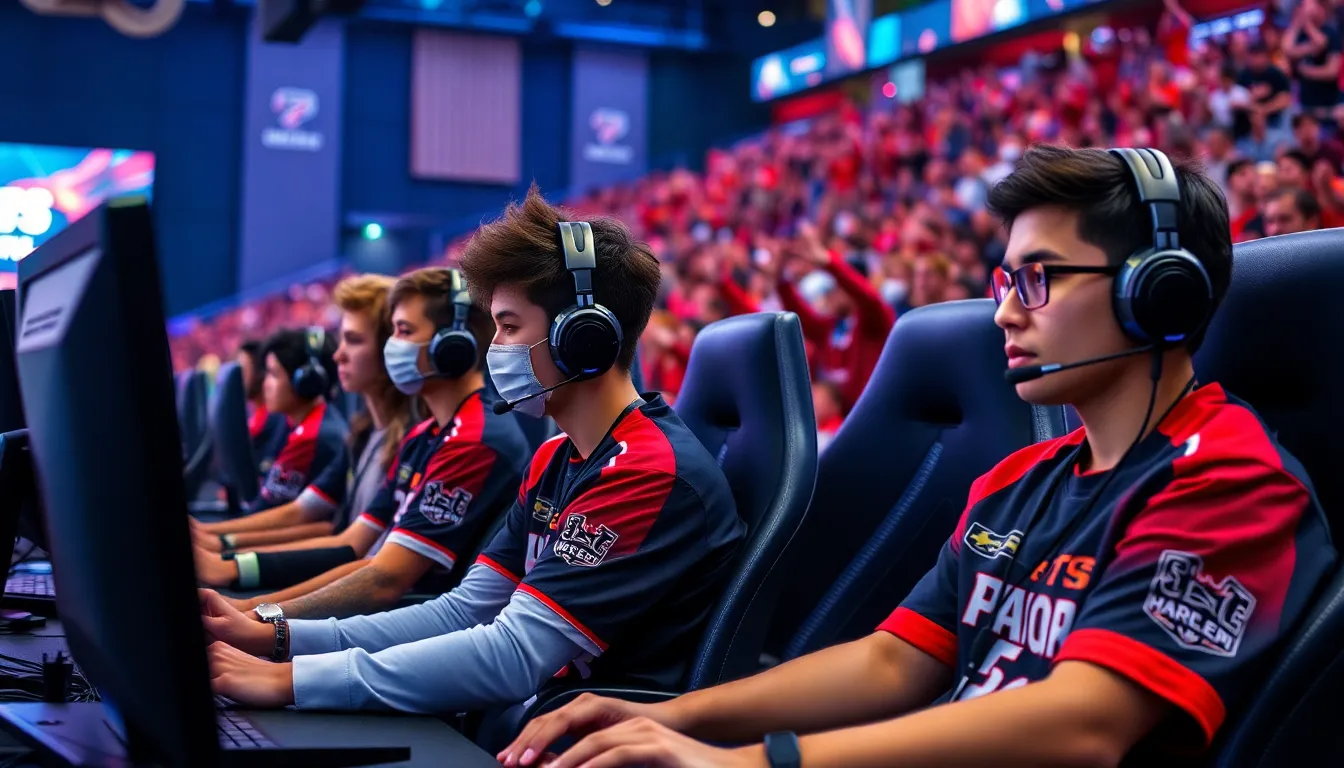The world of esports is booming, transforming from a niche hobby into a multi-billion-dollar industry. As gaming gains mainstream acceptance, opportunities in this vibrant sector are expanding rapidly. From professional players to behind-the-scenes roles, the landscape of esports jobs is as diverse as the games themselves.
With a variety of career paths available, those passionate about gaming can find fulfilling positions that suit their skills. Whether it’s event management, marketing, content creation, or coaching, the esports industry offers something for everyone. As the demand for talent grows, understanding the different roles and how to break into this exciting field becomes crucial for aspiring professionals.
Table of Contents
ToggleOverview of Esports Jobs
Esports offers a diverse range of job opportunities across many sectors. Professionals can pursue careers in game development, event management, marketing, content creation, coaching, and analytics. Each role contributes to the ecosystem surrounding esports, accommodating a variety of skills and interests.
Game Development
Game development involves designing and programming video games. Professionals may work as software developers, graphics designers, or sound engineers. They focus on creating engaging gaming experiences.
Event Management
Event management includes planning and executing esports tournaments and competitions. Event managers oversee logistics, coordinate teams, and ensure high production quality. They create memorable experiences for players and fans.
Marketing
Marketing roles in esports focus on promoting games and events. Marketers develop strategies to engage audiences through social media, sponsorships, and influencer partnerships. They drive brand awareness and increase participation in gaming events.
Content Creation
Content creation encompasses producing videos, podcasts, and written articles related to gaming. Content creators engage audiences by sharing game strategies, reviews, and news. They establish a presence in the esports community.
Coaching
Coaching involves training players to enhance their skills and strategies. Coaches analyze gameplay and provide feedback to help teams improve performance. Successful coaching can significantly impact competitive outcomes.
Analytics
Analytics professionals gather and analyze data from gameplay and audience engagement. They provide insights into player performance, game trends, and fan preferences. Analytics helps organizations make informed decisions to improve games and events.
Esports careers continue to expand as the industry grows. With various paths available, aspiring professionals can find opportunities that align with their skills and passions.
Types of Esports Jobs

Numerous job opportunities exist within the esports industry, each catering to distinct skills and interests. The following sections elaborate on various career paths in esports.
Player Careers
Player careers focus on professional gamers who compete in tournaments. These individuals dedicate hours to practice and refine their skills, often participating in teams that represent gaming organizations. Salaries can vary widely, typically ranging from $1,000 to $1 million annually, influenced by individual performance, sponsorships, and tournament winnings. Aspiring players need to excel in specific games, join competitive teams, and establish a strong online presence to attract attention from sponsors and fans.
Coaching and Management Roles
Coaching and management roles provide essential support to players and teams. Coaches develop strategies, analyze opponent tactics, and implement training regimens. They may earn between $30,000 and $150,000 depending on their experience and the team’s success. Management professionals, such as team managers and event coordinators, oversee logistics, marketing, and sponsorship deals. They play a crucial role in ensuring smooth operations and maximizing the team’s visibility and profitability.
Content Creation Opportunities
Content creation opportunities encompass a wide range of roles designed to engage fans and audiences. Content creators, including streamers, YouTubers, and social media influencers, focus on producing engaging videos, gameplay commentary, and live streams. Earnings in this sector vary significantly, from a few hundred dollars a month to multi-million dollar incomes, based on audience size and engagement. These creators often work with brands for sponsorships and promotions, enhancing their reach and financial potential in the esports ecosystem.
Skills Required for Esports Jobs
Aspiring professionals in the esports industry must develop a combination of technical and soft skills to excel in various roles. Each skill set caters to specific responsibilities, ensuring a well-rounded approach in this dynamic field.
Technical Skills
Technical skills play a crucial role in many esports positions. These include:
- Game Knowledge: Understanding game mechanics, strategies, and updates is essential for roles such as analysts and coaches.
- Content Creation Tools: Proficiency in software like Adobe Creative Suite helps content creators produce high-quality media, from graphics to video editing.
- Data Analysis: Familiarity with data analysis tools, including Excel and SQL, allows analytics professionals to interpret game and player data effectively.
- Event Management Software: Knowledge of platforms like Eventbrite and Discord streamlines tournament planning and communication.
- Programming Languages: Familiarity with languages such as C++ or Python can be vital for game developers to optimize gameplay and fix bugs.
Soft Skills
- Teamwork: Successful collaboration among players, managers, and coaches leads to better performance and cohesion.
- Communication: Clear communication is vital for conveying strategies and feedback between players and coaching staff.
- Problem-Solving: Adapting quickly to in-game challenges or logistical issues during events showcases strong problem-solving abilities.
- Creativity: Generating innovative ideas for content or marketing campaigns sets candidates apart in a competitive job market.
- Time Management: Managing multiple tasks, especially during peak event periods, ensures timely execution and minimizes stress.
Career Pathways in Esports
The esports industry offers diverse career pathways for individuals seeking to leverage their skills and interests. From entry-level positions to advanced roles, opportunities abound in this dynamic field.
Entry-Level Positions
Entry-level positions play a crucial role in building foundational skills and gaining industry experience. Common roles include:
- Event Staff: Assist in organizing and executing esports events, managing logistics, and ensuring smooth operations on-site.
- Social Media Coordinator: Manage social media accounts for gaming teams or companies, creating engaging content and interacting with the community.
- Content Creator: Produce and share videos, streams, or written content related to esports, helping to grow viewership and engagement.
- Community Manager: Foster relationships within gaming communities, gathering feedback and improving player experiences.
These positions typically offer annual salaries ranging from $25,000 to $50,000, depending on experience and location.
Advanced Career Opportunities
Advanced career opportunities in esports often require specialized skills and experience. Prominent roles include:
- Team Manager: Oversee team operations, including player recruitment and team performance analysis; salaries range from $50,000 to $100,000.
- Brand Strategist: Develop and implement marketing strategies for esports brands or teams, focusing on audience engagement and brand growth; salaries can reach $80,000 to $120,000.
- Game Designer: Create game mechanics and experiences that enhance player engagement, with salaries typically between $70,000 and $120,000.
- Analytical Specialist: Analyze data related to player performance and audience engagement, providing insights that facilitate informed decision-making; salaries vary from $60,000 to $110,000.
Pursuing advanced roles often involves continuous learning and leveraging networking opportunities within the esports community.
The esports industry presents a wealth of opportunities for those eager to carve out a career in this exciting field. As gaming continues to gain mainstream acceptance the demand for skilled professionals will only grow. Whether one is drawn to event management marketing or coaching there’s a role that aligns with diverse interests and talents.
With the right blend of technical and soft skills aspiring individuals can find their niche within this dynamic landscape. Continuous learning and networking will be crucial in navigating the evolving job market. Embracing the passion for gaming while developing the necessary expertise can lead to a fulfilling career in esports.





